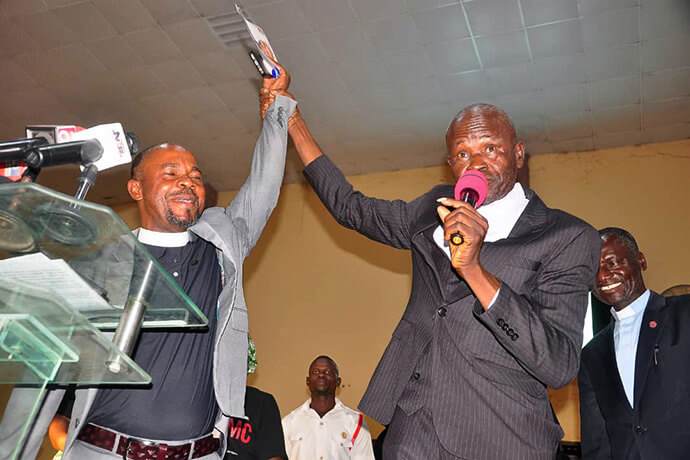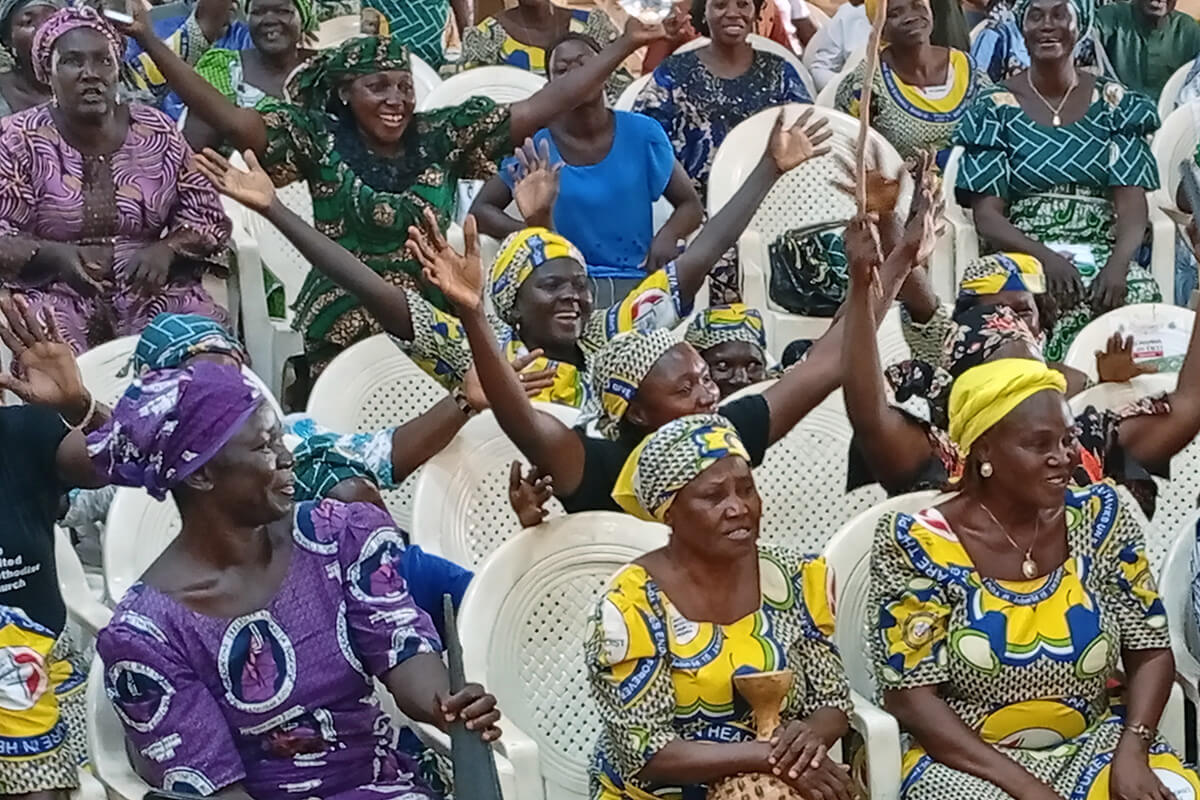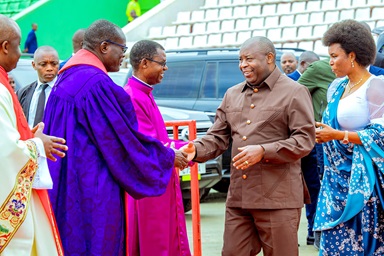Key points:
- Bishop Ande I. Emmanuel has held listening sessions across Nigeria’s regional conferences to hear members’ hopes and expectations.
- Evangelism is the main focus of The United Methodist Church in Nigeria as it seeks to bring more souls to Christ for the transformation of the world.
- A group that left the church more than 10 years ago has rejoined, bringing the number of annual conferences to five.
- The church is awaiting recourse from the courts regarding church properties and other legal matters involving former leaders who have joined the Global Methodist Church.
The United Methodist Church in Nigeria is moving forward, with major steps taken since the Dec. 7 election of Bishop Ande I. Emmanuel at the West Africa Central Conference.
Emmanuel, who has been active in leading The United Methodist Church in Nigeria forward as the assistant to the bishop since August 2024, began as resident bishop in Nigeria on Jan. 26. He said he is committed to unity and will lead to address the challenges that have arisen since the July 2024 departure of former leaders, who went on to form the Global Methodist Church in Nigeria.
The interim leadership team of Bishop John Schol and Bishop Eben K. Nhiwatiwa — appointed by the United Methodist Council of Bishops in July — had limited presence in Nigeria due to challenges raised by the Global Methodist Church with immigration authorities. Schol is based in the United States, and Nhiwatiwa is in Zimbabwe.
“I have begun work on our cardinal goals of uniting all United Methodists in Nigeria,” Emmanuel said. “I have held 25 listening and consultation sessions with key stakeholders across the five annual conferences. The purpose of these sessions is to seek unity and hear members’ concerns and how they want us to move forward. These listening sessions have so far been successful, and the majority have expressed willingness for the unity of The United Methodist Church in Nigeria.”
He said the church in Nigeria continues to thrive.
“Our church has remained steadfast and thriving, even in the face of challenges. By God’s grace, we continue to be the strongest in terms of population and congregational vitality, a testament to our unwavering faith and commitment.
“As we move forward, our focus will be on unity, reconciliation and capacity development, ensuring that we remain a beacon of hope and a source of transformation in our nation,” he said. “I urge all members to remain steadfast and not be distracted by those who attempt to embark on the mission impossible of destroying the church in Nigeria.
“Together, with God’s help, we will overcome every challenge and build a stronger, united church that fulfills its mission to make disciples of Jesus Christ for the transformation of the world,” Emmanuel said.

Chief among the church’s concerns is the recovery of The United Methodist Church’s certificate to operate as a denomination and properties and assets that were taken by former leaders who have joined the Global Methodist Church. To this end, the church is seeking recourse in the Nigerian courts, and a lawsuit was filed Dec. 17 in Abuja. The matter has been assigned a judge in the high court and the first reading of the case is set for March 3.
In the lawsuit, The United Methodist Church is seeking to reverse a Sept. 3 change of name at the government’s Corporate Affairs Commission, where the former church leaders had the church’s certificate of operation changed from United Methodist Church in Nigeria to Global Methodist Church in Nigeria. In the suit, The United Methodist Church in Nigeria described the change as “unlawful, invalid, null and void.”
The lawsuit also seeks to recover properties, including the church’s head office (secretariat) located at Mile 6 in Jalingo, Taraba State, and church funds held in a bank account that was also taken by the breakaway leaders.
“Instead of waiting to resolve the issues, UMC Nigeria is moving together with holy and bold plans to honor Jesus Christ and advance God’s mission and ministry through The United Methodist Church,” said Schol, who stepped down as Nigeria lead bishop Jan. 26.
Schol explained that evangelism was crucial to church growth. “Nigeria is the sixth most populated nation in the world, and United Methodists are in urban, rural and emerging communities. The ability to connect with all of the cultures, tribes and population makes it possible to reach new generations of disciples of Jesus Christ. In March, the Nigeria annual conferences will review and approve goals for making new disciples and starting new congregations.”
A key development has been the reunification with a group called the Southern Conference of The United Methodist Church, which left the denomination more than 10 years ago after refusing to recognize the authority of former Bishop John Wesley Yohanna. The group’s leader, the Rev. Philip Micah Dopah, was appointed dean of cabinet of the Southern Conference by Schol.
The church in Nigeria now has five annual conferences: Southern Nigeria, Central Nigeria, Northeast Nigeria, Northern Nigeria and the Southern Conference. The episcopal area also has expanded to include the mission districts of Senegal and Cameroon following the exit of the Côte d’Ivoire Conference.
“The unification is a time of renewal and opportunity for greater evangelism and mission,” Schol said. “UMC Nigeria will unify United Methodists around a common mission that develops spiritual and transformational leaders, making disciples, growing congregations and transforming the world. The conferences and mission districts are embracing the new unity of mission.”
Schol had called for talks in November between the United Methodist and Global Methodist churches to address simmering tensions between the two groups. Those tensions erupted into Dec. 15 attacks in Munga Dossa, where three young United Methodists, including two toddlers, were killed and 10 United Methodists were injured.
Subscribe to our
e-newsletter
A meeting of the bishops of the two denominations was held Dec. 26, and all the bishops expressed deep concern. Schol and Emmanuel said the United Methodist bishops offered five steps that both sides could take together to reduce and eliminate harm, and they are waiting for a response to the proposal, which was provided in writing to the Global Methodist bishops.
Amid the disruption and challenges, United Methodist leaders in Nigeria have continued to call on members to remain prayerful and peaceful and allow the police and courts to do their work.
The Dec. 15 incident was widely condemned, with the Africa Methodist Council — a council of all Methodist denominations in Africa — calling for prayers and peace to prevail in Nigeria.
“The Africa Methodist Council stands with the Council of Bishops of The United Methodist Church and call for prayers and peace in the Nigeria UMC. We condemn any violence at whatever level and especially when it is an ecclesiastical violence. There is no space for violence in the Methodist tradition as John Wesley taught, ‘Though we may not think alike, may we not love alike,’” said the Most Rev. Paul Kwabena Boafo, president of the Africa Methodist Council.
Responding to UM News’ questions regarding the church properties, the GMC Assembly of Bishops said: “As leaders of the Global Methodist Church, we recognize the presence and ministry of the United Methodist Church, along with other churches and denominations in Nigeria. It is our fervent prayer that the body of Christ, in all its expressions, will work together to proclaim the good news of Jesus Christ to a hurting world.
“At this time, we do not believe it is prudent to comment on legal disputes regarding property. As both United Methodists and Global Methodists navigate this transitional season, we are mindful of the potential for misinterpretation or misunderstanding. Comments made prematurely or without full context could inadvertently cause further harm, and we are committed to avoiding such outcomes,” the statement said.
“As we continue to monitor developments in this situation, our priority remains fostering reconciliation and supporting the communities affected by this tragedy. We are dedicated to collaborating with all who seek to bring hope, healing, and the light of Christ to those in need. The Global Methodist Church will persist in its mission to embody the love of Christ through prayer, action, and steadfast commitment to peace and justice.”
At December’s West Africa Central Conference, United Methodist leaders acted to refute an allegation that the denomination in Nigeria was “a gay church.” Delegates at the gathering agreed to add an addendum to the proposed West Africa Central Conference Book of Discipline.
The declaration made in Ghana stated, “The West Africa Central Conference and its member Episcopal Areas and Annual Conferences shall adhere to the national, state and local laws concerning LGBTQ+. The West Africa Central Conference further affirms that marriage is between a man and a woman. The annual conferences of the West Africa Central Conference may add to their own policies that further enhance and clarify this paragraph, holding strictly to their national, state and local laws.”
Chikwanah is a correspondent for UM News based in Harare, Zimbabwe.
News media contact: Julie Dwyer at (615) 742-5470 or [email protected]. To read more United Methodist news, subscribe to the free UM News Digests.




